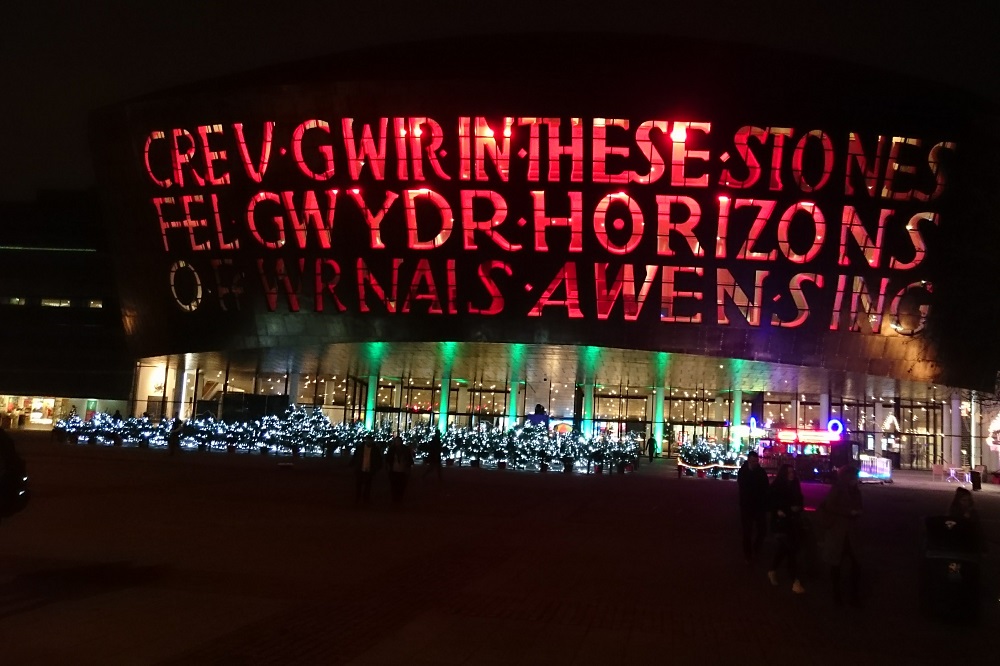The success of Welsh theatre-makers, and the failure of Welsh theatre

Gary Owen
Welsh theatre is curious.
And it’s been in a curious state for so long that we who are caught up in Welsh theatre often don’t see how curious it is. And of course, few outside the sector give it much thought at all.
So to try and put across just how curious Welsh theatre sector, let me outline an alternate reality.
In this alternate Wales, we have a Principality Stadium on the banks of the Taff, and just as in our Wales several times a year it fills up with 70,000 Welsh fans watching international rugby.
But in this alternate reality, Wales doesn’t have a rugby team.
Welsh fans pay for tickets to watch England play Ireland, or Ireland play New Zealand, or New Zealand play Australia – but they never watch a Wales team. Because we don’t have one.
Imagine that plenty of the players and coaches of the international teams that play in Cardiff are actually Welsh by heritage or residence. Imagine that we have a passionate schools rugby set up and amateur rugby leagues producing brilliant players – who all move out of Wales to play professional rugby, and then qualify for the national teams of our neighbours.
Now imagine that occasionally people in the grassroots of the game wonder if we might build professional teams and even a national side and compete internationally ourselves. But whenever these possibilities are raised, the people running sport in Wales say it can’t be done.
Welsh talent
They say we don’t have the talent for professional rugby – even as Welsh talent haemorrhages out of the country. They say there’s no audience for rugby here, even as hundreds of thousands of people flock to watch rugby played by our neighbours. And they say there’s no money in Welsh rugby, even as millions in ticket revenue from Welsh rugby fans goes straight into the coffers of other rugby unions.
That situation would be madness. A pointless squandering of talent and opportunity. And left to go on for decades, that squandering would come to seem almost cruel.
That situation is precisely the situation of theatre in our Wales, now.
In Cardiff the WMC brings in shows which sell out its 1,500-seater main auditorium for 6 week runs. At 6 shows per week with an average ticket price of £20, that’s over a million pounds in ticket revenue. Typically, 90% of that revenue flows out of Wales to the show’s producing company, and only around 10% goes to the WMC. And the money does flow out of our industry, because these shows are never created by Welsh theatre companies.
If we were able to attract even a fraction of the audience that exists in Cardiff and keep the income they generate within Welsh theatre, it could transform our sector beyond recognition. We could be producing work, employing people, and reaching audiences here and worldwide that we don’t yet dare to imagine. But we don’t do it. All the shows that come in to the WMC’s main stage come in from outside Wales and they take their ticket money home with them.
And instead of developing work that could play at the WMC and the other bigger stages in Wales, our theatre companies make do with the status quo. They create the small amount work that they can afford to with their arts council subsidy and do no more.
Because they can do no more. Because the mindset of our subsidised theatre companies is that putting on a show is only ever a cost, and never an opportunity to make money and grow the sector.

No successful theatre culture works this way. If you look – for example – to the National in London, to the RSC in Stratford, it is a routine part of their strategy that some shows will cost money, some shows will break even, and some shows will go on to generate income for the company, often for many years into the future.
We see these shows in Wales, once they’ve run in the West End and make their way to the touring circuit. The National’s One Man Two Guv’nors and Warhorse packed out the WMC, as did the RSC’s Matilda, and Sheffield Theatres’ Everyone’s Talking About Jamie, and the income they earn from our audiences goes to fund still more work at those theatres.
We know there is an audience for theatre in Wales – a huge, untapped audience. And audiences bring in money, so we know there’s the money.
Is it, then, that as a small nation, we don’t have the talent?
Much-loved work
But of course, we do. We have writers, directors and actors doing incredible and much-loved work in the theatre, all over the world.
I’ve maintained a career as a playwright for twenty years because my plays are produced internationally, from Argentina and the States to South Korea and Japan. Our best theatre talents are among the best in the world and are snapped up by TV companies and film producers. And when great actors do theatre, they tend to want to do it on big stages, at prestigious theatres – and those theatres are dying to have them.
So why haven’t we changed things?
If you look at the biggest and most prestigious theatre companies making work wholly or partly in English, their artistic directors tend to arrive, stay in post for 4 to 6 years, and then depart for better jobs in bigger theatres beyond Wales.
It’s a huge thing for an artistic director to rebuild the way a theatre works and change the culture of a company in such a short time. There will be mistakes and failures along the way. It takes courage and vision to come up with a good idea, first of all.
But then it takes skill, charm and plain luck to attract the cast and crew who will make the idea sing on stage.
You can spend years tailoring a lead role for a star actor who will pull in the crowds – only for them to be offered Young Gandalf in the new Lord of the Rings series and disappear to New Zealand for two years. And even if you make a great show, your run can be derailed by unseasonably hot weather, or transport chaos, or the bad moods of critics, or the non-appearance of critics, or, as we have learned, viruses.
Ambitious
Artistic directors tend to be fairly ambitious people – they have to be, or they wouldn’t be in the job. And so an artistic director arriving in Wales already has one eye on their next job.
Big theatre jobs tend to be in London, and theatre people in London tend to know nothing about theatre in Wales beyond what they read in The Stage and The Guardian. And so to work towards their next big job in London, an artistic director in Wales will be wanting to generate some sparkling five star reviews in those two papers. And of course, they can do that within the status quo as it exists now.
They can use the subsidy they get from ACW to do a handful of shows each year, and if they have talent as directors – and most of them do, or they wouldn’t be in the job – the praise of the London papers will come. But there’s no incentive for an ambitious artistic director to do the far riskier work of building an audience here and growing the sector.
In fact there’s considerable incentive for artistic directors to pour vast resources into a show in hopes that it be a critical hit, and ignore the fact that the huge costs of that show mean it will lose money even if it sells every single ticket to every single performance. And so very often, even our theatre successes are actually failures, from the perspective of building the sector.
Artistic directors are overseen by boards of voluntary trustees. Why then, don’t these boards insist that their artistic directors do more to build the sector?
There are lawyers, business leaders, experts on catering, fundraising, there are writers and actors – but what we tend not to find on the boards of theatres in Wales are people who themselves have direct experience of running theatres.
Headhunted
Again, in more successful theatre cultures, things are different. For example, the Sherman’s last artistic director, Rachel O’Riordan, was headhunted to run the Lyric Hammersmith, one of the biggest theatres in London. And the chair of her board at the Lyric is Lisa Berger – who, in her day job, was executive director of the National Theatre (Lisa was born and bred in Cardiff, as it happens, but left for London – so she could get a job in theatre).
At the Sherman, as at other major Welsh theatres, there is no-one on the board who has ever themselves run a major theatre. And this lack of knowledge of the detail of running a theatre and of the wider theatre world means that boards tend to accept the curious state of Welsh theatre is more or less the best we can expect from the sector. When it really is not.
You would think, given the parlous state of the Welsh economy, that politicians would be eager to see any sector grow and prosper and employ more people and bring in more money. So why haven’t they stepped in and insisted that theatre pull itself together?
Of course, we don’t have a minister for the arts. Portfolios change in Welsh government, but typically the arts or culture are bundled along with a couple of other huge areas – pick any two from tourism, sport, the Welsh language – and given to a deputy minister.

Theatre is one part of one part of that deputy minister’s portfolio, and that deputy minister only has twenty-four hours in a day. So, to quickly bring themselves up to speed on the state of theatre, who does the deputy minister consult?
First, they consult the bosses. The people who leave Welsh theatre languishing in its curious state, are the first people politicians talk to. But our politicians are not idiots, so they don’t leave it there.
Once they’re done with the bosses, they consult theatre academics – people who are paid to critically reflect on theatre and its place in our society, who you might reasonably think are well placed to offer a summary of the sector.
Academics
The problem is that in Wales, our theatre academics are not interested in the mainstream theatre that thousands of Welsh people pay good money to see.
They are interested in “performance”. They are interested in exploring and interrogating the form of theatre.
They often are also performance artists and run the two careers side by side. But that means they never have to earn a living from their art. They’re insulated from the need to find and serve an audience that can sustain their art form.
Experimental work that pushes the form is a vital part of any healthy theatre ecology. It’s not that I don’t think we should be doing performance art. I think we should be doing more of it, in a bigger theatre sector.
The problem is that the performance artists who dominate the academic sector often disparage other, more mainstream forms of theatre.
They dismiss putting on popular plays as “just getting bums on seats” – as if serving the people whose taxes pay for whole subsidised sector was somehow dishonourable.
Colonial import
Or they will dismiss traditional text based theatre as a “colonial import” from England. The notion that plays as a form belong to the English is, of course, nonsense. The Irish, for example, have done pretty well out of plays written by playwrights and put on in theatres.
If you want evidence of the snobbishness of our academic sector, and the broader critical sector that grows from it, you need look no further than its treatment of the late Frank Vickery.
Frank was a hilarious and heart-breaking writer, a gay man from a working-class background who never left the working class community he grew up in.
Frank made plays out of the most everyday lives, and his writing can be broad and comic just as often as it is sharp and shrewd. He’s probably the closest thing we’ve ever had to a Welsh Alan Ayckbourn. So it’s instructive to compare how the two writers were treated in their respective nations.
Ayckbourn was awarded with honourary doctorates by a number of universities, and in 1992 was made Cameron Mackintosh Professor of Contemporary Theatre at Oxford. Whereas Frank – Frank’s work was dismissed and often simply ignored by critics and academics in Wales.

A country that likes to imagine it holds literature and the arts in high esteem, snubbed one of the most vital writers we’ve ever produced. We should hang our heads in shame.
We live in an age where we face bafflingly complex problems but communicate with one another through online forms that wipe out nuance, and reward glibness and outrage. Our TV is increasingly dominated by vast franchises that have to appeal to vast, global audiences.
Vital role
Theatre has a vital role to play in helping us understand ourselves and each other. It’s a form that, when it works, entertains an audience while taking them through a complex emotional experience, understanding lives very different from their own.
It can be incredibly local and specific, and yet resonate across the world. And it can provide quality jobs that do not depend on tourism but may still encourage people to travel here – as the West End draws people to visit London, or the festival draws people to Edinburgh.
These days all our arts leaders are talking a good fight about finally making sure that people from all communities get to participate. Our theatres are awash with schemes to discover new talent from previously neglected or excluded communities. And the talent is there.
Every single initiative is turning up brilliant people with fantastic stories to share. But all these initiatives are – I’m sure without meaning to be – dishonest. Because in its current underdeveloped state, our theatre sector doesn’t have the capacity to make work by even a fraction of the people who have stories worth telling.
So if a theatre boss is telling you how they are going to put on more work by a more diverse group of theatre makers, and they’re not also telling you how they plan to grow their audience and thus the capacity of their sector, then they are either being very stupid, or somewhat disingenuous. And I can guarantee, these people are not stupid.
We have a huge audience for theatre in Wales.
We have the talent to make theatre, in abundance. Now our artistic directors need to take up the challenge of making work that will serve bigger audiences, and allow us to grow the sector. And if they can’t, or won’t, then we need our politicians to finally see the curious, cruel, wasteful state of Welsh theatre, and insist that it changes for the better.
Gary Owen is an award-winning playwright and TV writer and was previously script editor at BBC Wales Drama.
His plays have been performed across the United Kingdom and as far afield as Canada and Australia.
Support our Nation today
For the price of a cup of coffee a month you can help us create an independent, not-for-profit, national news service for the people of Wales, by the people of Wales.






I agree that when it comes to producing theatre Wales is useless but when it comes to grant farming there are none better.
First appointment? Fundraiser. Second? Administrator.